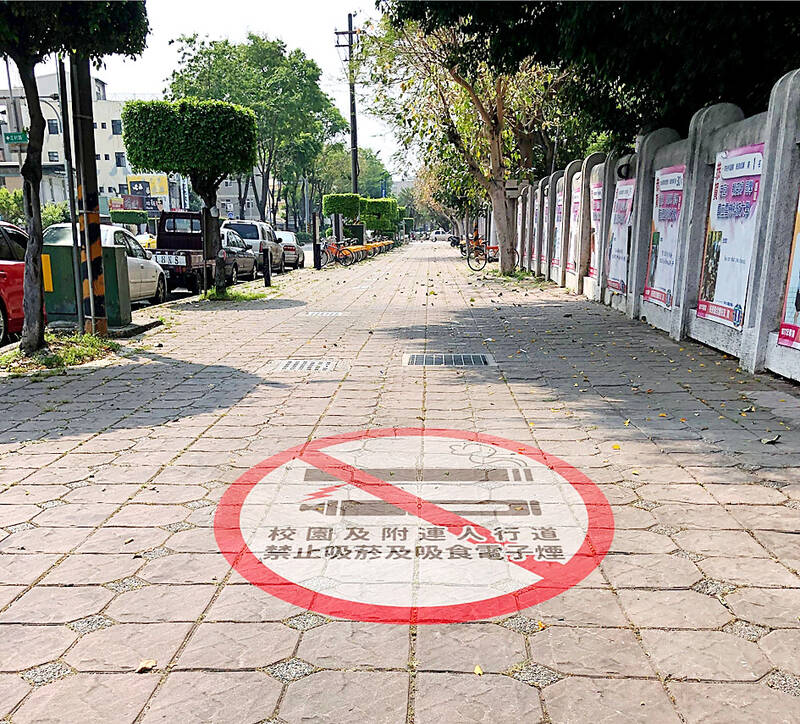Blanket prohibitions against smoking on university campuses have increased the risks of second-hand smoke, student groups said on Thursday, calling for changes to designate legal spaces for smoking.
A study of 30 universities and colleges that totally banned smoking on campus following the legislature’s passage of amendments to the Tobacco Hazards Control Act (菸害防制法) in 2023 showed that areas frequented by smokers have become more widespread, the groups told a news conference in Taipei.
Smoking in nearly 70 percent of the schools surveyed has spread around campuses’ periphery, National Chung Cheng University student Tsai Ching-hung (蔡璟鴻) said.

Photo copied by Tsai Shu-yuan, Taipei Times
The amount and diffusion of cigarette litter have surged since schools abolished designated smoking areas and removed ashtrays from campus grounds, he said.
More students and local residents reported being affected by second-hand smoke or cigarette litter than ever because the bans drove tobacco users to smoke in secluded locations, he said.
In contrast, National Chengchi University — which passed regulations allowing smoking in designated areas the same year — reported a reduction in second-hand smoke and improved cleanliness, said Ho Chieh-en (何傑恩), an alumnus and former student government member at the university.
Legislators amended the law without asking the opinion of college students who would be most affected by policy changes, resulting in counterproductive laws, he said.
The government’s anti-tobacco campaign stigmatized smokers and sowed discord in society, said Cheng Yu-fang (鄭羽芳), a student at National Taiwan University’s Graduate Institute of Building and Planning.
A sampling of social media frequented by college students revealed instances of hate speech against smokers, including posts claiming smokers “do not deserve rights” or calling them “human garbage that must be cleansed,” she said.
Lawmakers should rectify the mistakes made in the amendments by allowing student governments to reinstate smoking zones, she said.
Health authorities should change the tone of their anti-tobacco messaging to avoid inciting hostility toward the people their policies were supposed to help, Cheng said.
The Taiwan Youth Association for Democracy voiced doubts about the proposed amendment at the time, but the legislature turned a deaf ear, organization’s director Alice Yang (楊姿潁) said.
Lawmakers ignored differences in campus geography and truncated the public opinion solicitation process, she said.
The government’s inflexibility and failure to adapt policy to reality were to blame for the persistence of smoking-related problems, Yang added.
Better Together for NextGen Taiwan deputy chairman Lin Ssu-kai (林思愷) said the law went against the principle of university autonomy and its top-down approach to regulations.
University students and faculty should be included in major policy decisions that affect their lives, he added.

The manufacture of the remaining 28 M1A2T Abrams tanks Taiwan purchased from the US has recently been completed, and they are expected to be delivered within the next one to two months, a source said yesterday. The Ministry of National Defense is arranging cargo ships to transport the tanks to Taiwan as soon as possible, said the source, who is familiar with the matter. The estimated arrival time ranges from late this month to early next month, the source said. The 28 Abrams tanks make up the third and final batch of a total of 108 tanks, valued at about NT$40.5 billion

Two Taiwanese prosecutors were questioned by Chinese security personnel at their hotel during a trip to China’s Henan Province this month, the Mainland Affairs Council (MAC) said yesterday. The officers had personal information on the prosecutors, including “when they were assigned to their posts, their work locations and job titles,” MAC Deputy Minister and spokesman Liang Wen-chieh (梁文傑) said. On top of asking about their agencies and positions, the officers also questioned the prosecutors about the Cross-Strait Joint Crime-Fighting and Judicial Mutual Assistance Agreement, a pact that serves as the framework for Taiwan-China cooperation on combating crime and providing judicial assistance, Liang

A group from the Taiwanese Designers in Australia association yesterday represented Taiwan at the Midsumma Pride March in Melbourne. The march, held in the St. Kilda suburb, is the city’s largest LGBTQIA+ parade and the flagship event of the annual Midsumma Festival. It attracted more than 45,000 spectators who supported the 400 groups and 10,000 marchers that participated this year, the association said. Taiwanese Designers said they organized a team to march for Taiwan this year, joining politicians, government agencies, professionals and community organizations in showing support for LGBTQIA+ people and diverse communities. As the first country in Asia to legalize same-sex

MOTIVES QUESTIONED The PLA considers Xi’s policies toward Taiwan to be driven by personal considerations rather than military assessment, the Epoch Times reports Chinese President Xi Jinping’s (習近平) latest purge of the Chinese People’s Liberation Army (PLA) leadership might have been prompted by the military’s opposition to plans of invading Taiwan, the Epoch Times said. The Chinese military opposes waging war against Taiwan by a large consensus, putting it at odds with Xi’s vision, the Falun Gong-affiliated daily said in a report on Thursday, citing anonymous sources with insight into the PLA’s inner workings. The opposition is not the opinion of a few generals, but a widely shared view among the PLA cadre, the Epoch Times cited them as saying. “Chinese forces know full well that